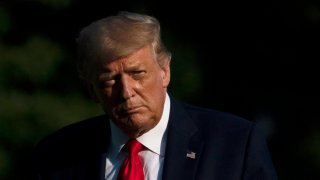
President Donald Trump on Tuesday demanded that the United Nations hold China accountable for the coronavirus pandemic as he defends his own handling of COVID-19 in America where the death toll has surpassed 200,000.
“We have waged a fierce battle against the invisible enemy – the China virus – which has claimed countless lives in 188 countries,” Trump said in a prerecorded address to the U.N. General Assembly that lasted less than seven minutes.
“As we pursue this bright future, we must hold accountable the nation which unleashed this plague onto the world: China.”
While Trump blames China, he has been harshly criticized for his administration's track record in battling the coronavirus, now a top issue in his bid for reelection. Democratic opponent Joe Biden claims Trump bungled the response to COVID-19 and is responsible for the U.S. having more deaths than any other nation. Trump encouraged the reopening of U.S. society even as the virus was spreading rapidly and holds campaign rallies where few wear face masks or practice social distancing.
But Trump points to the virus' origins in China and says the Chinese government acted irresponsibly in allowing the virus to spread.
“The United Nations must hold China accountable for their actions,” Trump said. The president also took aim at China's environmental record and the United Nations itself.
“Those who attack America’s exceptional environmental record while ignoring China’s rampant pollution are not interested in the environment. They only want to punish America. And I will not stand for it,” Trump said.
Politics
Earlier in his administration, Trump hosted Chinese President Xi Jinping at his Florida club and spoke warmly of their relationship, but the two nations now regularly exchange angry words and take punitive actions against each other.
Trump is not popular at the United Nations and his speech this year comes at a time when U.N. members are pushing back against Washington. On Monday, Trump declared that all U.N. sanctions against Iran have been reimposed, a move that most of the rest of the world rejects as illegal.
Trump's statement came shortly after he signed an executive order spelling out how the U.S. will enforce the “snapback” of sanctions. “My actions today send a clear message to the Iranian regime and those in the international community who refuse to stand up to Iran," he said.
The U.S. said it was reimposing sanctions on Iran for being in noncompliance with the 2015 nuclear deal between Tehran and global powers. But Trump in 2018 pulled out of the deal in which Iran agreed to curb its nuclear program in exchange for billions of dollars in sanctions relief.
Few U.N. member states believe the U.S. has the legal standing to restore the sanctions because Trump withdrew from the agreement. The U.S. argues it retains the right to do so as an original participant in the deal and a member of the council.
Trump also highlighted agreements the U.S. brokered between Israel and the United Arab Emirates and Bahrain. The historic agreements come as relations between the Jewish state and Arab nations are thawing as a pushback against Iran.
The president also mentioned the U.S. brokering of economic cooperation between Serbia and Kosovo.
He didn't mention the threat from North Korea's nuclear weapons. In his speech in 2017, Trump told the U.N. he was bringing a “message of peace,” but then said that if the U.S. was forced to defend itself against Kim Jong Un, “we will have no choice but to totally destroy North Korea.” He called Kim “rocket man,” but has since met with him three times, although North Korea has not made a move to give up its nuclear weapons.
Trump's has tussled with multilateral organizations throughout his presidency, although his aides say he is not against all multilateral groups, only the ones that aren't effective. After COVID-19 took hold, Trump yanked support from the U.N.'s World Health Organization, saying it was too beholden to China.



